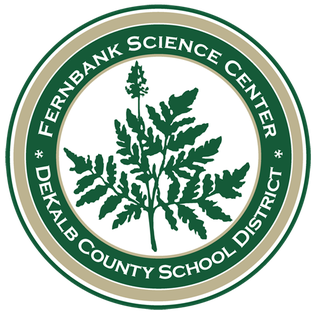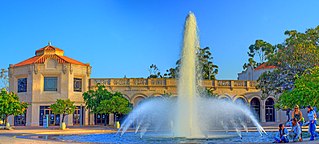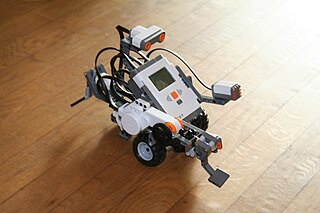
Lego Mindstorms is a discontinued line of educational kits for building programmable robots based on Lego bricks.
The Oregon Museum of Science and Industry is a science and technology museum in Portland, Oregon, United States. It contains three auditoriums, including a large-screen theatre, planetarium, and exhibition halls with a variety of hands-on permanent exhibits focused on natural sciences, industry, and technology. Transient exhibits span a wider range of disciplines.

The Bibliotheca Alexandrina (BA) is a major library and cultural center on the shore of the Mediterranean Sea in Alexandria, Egypt. It is a commemoration of the Library of Alexandria, once one of the largest libraries worldwide, which was lost in antiquity. The idea of reviving the old library dates back to 1974 when a committee set up by Alexandria University selected a plot of land for its new library. Construction work began in 1995, and after some US$220 million had been spent, the complex was officially inaugurated on 16 October 2002. In 2009, the library received a donation of 500,000 books from the Bibliothèque nationale de France (BnF). The gift makes the Bibliotheca Alexandrina the sixth-largest Francophone library in the world.

The FIRST LEGO League Challenge is an international competition organized by FIRST for elementary and middle school students.

The Fernbank Science Center is a museum, classroom, and woodland complex located in Atlanta. It is owned and operated by the DeKalb County School District, which announced in May 2012 it was considering closing the facility to cut its annual budget, then quickly shelved the plan after public outcry. The nearby Fernbank Museum of Natural History is a private non-profit organization that is separate from the Science Center.

The Clark Planetarium is a planetarium and science museum situated within The Gateway at the intersection of 400 West and 100 South in downtown Salt Lake City, Utah, United States. The Clark Planetarium opened in April 2003, replacing the historic Hansen Planetarium under a grant from the Clark Foundation in cooperation with Salt Lake County.

The Fleet Science Center is a science museum and planetarium in Balboa Park, located in San Diego, California. It is at the east end of the El Prado Drive walkway, next to the Bea Evenson Fountain and plaza in central Balboa Park.

Liberty High School (LHS) is a four-year public high school in Eldersburg in Carroll County, Maryland.

Armagh Planetarium is a planetarium in Armagh, Northern Ireland. It is located close to the city centre and neighbouring Armagh Observatory in approximately fourteen acres of landscaped grounds known as the Armagh Astropark.

The Houston Museum of Natural Science is a natural history museum located on the northern border of Hermann Park in Houston, Texas, United States. The museum was established in 1909 by the Houston Museum and Scientific Society, an organization whose goals were to provide a free institution for the people of Houston focusing on education and science. The museum complex consists of a central facility with four floors of natural science halls and exhibits, the Burke Baker Planetarium, the Cockrell Butterfly Center, and the Wortham Giant Screen Theatre. In 2022, the museum received 1,520,000 visitors, making it seventh on the List of most-visited museums in the United States, and was the third most-visited U.S. science museum. Much of the museum's popularity is attributed to its large number of special or guest exhibits.

Lego Mindstorms NXT is a programmable robotics kit released by Lego on August 2, 2006. It replaced the Robotics Invention System, the first-generation Lego Mindstorms kit. The base kit ships in two versions: the retail version and the education base set. It comes with the NXT-G programming software or the optional LabVIEW for Lego Mindstorms. A variety of unofficial languages exist, such as NXC, NBC, leJOS NXJ, and RobotC. A second-generation set, Lego Mindstorms NXT 2.0, was released on August 1, 2009, with a color sensor and other upgrades. The third-generation EV3 was released in September 2013.

Ismail Serageldin, Founding Director of the Bibliotheca Alexandrina (BA), the new Library of Alexandria, inaugurated in 2002, is currently, Emeritus Librarian, and member of the Board of Trustees of the Library of Alexandria. He serves as Chair or Member of a number of advisory committees for academic, research, scientific and international institutions and civil society efforts, and serves on the Advisory Committee of the World Social Science Report for 2013 and 2016, as well as the UNESCO-supported World Water Scenarios (2013) and the executive council of the Encyclopedia of Life (2010) and Chairs the Executive Council of the World Digital Library (2010). He also co-chaired the African Union's high level panel for Biotechnology (2006) and again for Science, Technology and Innovation (STI) in 2012–2013, and was a member of the ICANN Panel for the review of the internet future (2013).
The Discovery Science Center and Planetarium is a hands-on science center in Bridgeport, Connecticut, that serves as both a tourist destination and an educational resource for area schools. The Discovery Science Center provides dynamic, hands-on STEM experiences designed to resonate with the innate curiosity, learning desire, and spirit of exploration of visitors, encouraging young learners to ask questions, solve problems, and engineer solutions today so they are better prepared to embrace the challenges of tomorrow.

FIRST LEGO League Explore (FLLE) is a non-competitive robotics program designed for children ages six to ten. It is one of the programs established by FIRST.

The FIRST Championship is a four-day robotics championship held annually in April at which FIRST student robotics teams compete. For several years, the event was held at the Georgia Dome in Atlanta, Georgia, but moved to the Edward Jones Dome in St. Louis, Missouri in 2011, where it remained through 2017. In 2017, the Championship was split into two events, being additionally held at the George R. Brown Convention Center and Minute Maid Park in Houston, Texas. In 2018 and 2019, the Championship was held in Houston and Detroit, Michigan at the TCF Center and Ford Field. The event comprises four competitions; the FIRST Robotics Competition Championship, the FIRST Tech Challenge World Championship, the FIRST Lego League World Festival, and the FIRST Lego League Junior World Expo.
Livingston Robotics Club (LRC) is a robotics club in Livingston, New Jersey, that provides a community network to introduce Livingston area youth to robotics design and real-life science research, consistent with the vision of FIRST. LRC is known for its member teams as winners at state, national, and international FIRST LEGO League (FLL) competitions.
FIRST LEGO Challenge League Open Championships are robotics competitions held and managed by FIRST LEGO League Partners to bring FIRST LEGO League Challenge teams from many states, regions and countries together to compete in host cities around the world. These are the highest level of FIRST LEGO League competitions that are managed by organizations other than FIRST. The FIRST-managed global competition for FIRST LEGO League is the FLL World Festival. There are usually multiple Open Championships each year.
Digital Universe Atlas is a free open source software planetarium application, available under the terms of the Illinois Open Source License, and running on Linux, Windows, macOS, AmigaOS 4, and IRIX.

Abrams Planetarium is the planetarium on the campus of Michigan State University, Michigan, United States.
Omar Mohamed El-Sayed Fikri is an Egyptian writer and astronomer, born in Giza Governorate in 1965. He received a bachelor's degree in astronomy from the Faculty of Science at Cairo University in 1987, and a master's degree in astronomy from the Faculty of Science at Cairo University in 1992, then a PhD in astrophysics from the Faculty of Science at the University of Alexandria in 2006. Omar Fikri worked at the Halwan Observatory, then at the Kuwait Planetarium Science Center (PSC). He is currently the head of the Planetarium Theater Department at the Bibliotheca Alexandrina.














